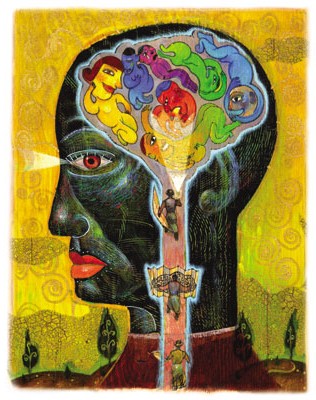Dreams have long been a source of fascination, mystique, and curiosity. Beyond the fantastical landscapes and surreal scenarios, dreams offer a unique window into the depths of our minds, providing insights into emotions and experiences that may remain hidden in our waking lives. This article delves into the realm of emotional dreams, shedding light on their connection to the subconscious mind and their role in unveiling unresolved feelings.
The Science of Dreaming and Emotions
When we close our eyes at night, we enter a realm where our mind becomes a canvas for the subconscious to paint vivid pictures. Dreaming predominantly occurs during the Rapid Eye Movement (REM) sleep phase. Research suggests that during REM sleep, the brain is highly active, processing emotions, and integrating memories.
Dr. Elizabeth Kensinger, a neuroscientist, explains, “The amygdala and hippocampus, brain regions critical for processing emotions and memories, are particularly active during REM sleep. This activation can contribute to the emotional intensity of dreams.”
Unpacking the Subconscious Mind
Our minds are composed of layers, each with its own functions. The subconscious mind resides just below the surface, influencing our thoughts, decisions, and behaviors. Dreams often act as messengers from this hidden realm, bringing forth emotions and experiences that might be obscured in our conscious awareness.
Dr. Carl Jung, the Swiss psychiatrist, described dreams as a “mirror of the unconscious,” reflecting the unspoken and unresolved aspects of ourselves. Emotional dreams, in particular, act as bridges, connecting us with deeply buried feelings that may have been brushed aside in our waking lives.
Types of Emotional Dreams
Emotional dreams manifest in various forms, each offering a unique insight into our psychological landscape:
- Nightmares: These intense and distressing dreams often tap into our deepest fears and anxieties. While unsettling, nightmares can serve as signals for unresolved emotional issues that require attention.
- Recurring Dreams: When a dream becomes a frequent visitor, it’s a sign that our subconscious is urging us to confront an issue we might be ignoring.
- Lucid Emotional Dreams: In these dreams, the dreamer becomes aware of their dream state and can actively engage with their emotions. This presents an opportunity for conscious emotional exploration.
Symbolism and Dream Interpretation
Within the landscape of dreams, symbols act as a language that the subconscious uses to communicate. A house might symbolize our psyche, a flowing river could represent the passage of time, and flying might mirror our desire for freedom.
Dreams are the touchstones of our character,” says Henry David Thoreau, emphasizing the importance of understanding the symbolic language of our dreams. However, interpreting these symbols is highly personal and influenced by cultural and individual contexts.
The Therapeutic Perspective
Throughout history, dream analysis has been a cornerstone of psychotherapy. Sigmund Freud and Carl Jung pioneered the exploration of dreams as pathways to the subconscious mind. Modern therapists continue to use dreams as tools for uncovering hidden emotions and traumas.
Dr. Sarah Reynolds, a licensed therapist, recounts, “In my practice, I’ve witnessed emotional dreams leading to breakthroughs. Clients have gained profound insights into their struggles by analyzing dream content and identifying parallels in their waking lives.”
Lucid Dreaming and Emotional Resolution
Lucid dreaming takes emotional exploration a step further. In a lucid dream, the dreamer becomes conscious of the dream state and can even exert some control over the dream’s course. This presents an opportunity to confront and process unresolved emotions head-on.
Lucid dreaming enthusiast Mark Johnson shares, “When you’re aware you’re dreaming, you can confront your fears and emotional baggage in a safe environment. It’s like a rehearsal for real-life emotional challenges.”
Cultural and Psychological Influences on Emotional Dreams
Emotional dreams are not only shaped by individual experiences but also by cultural beliefs and societal influences. The themes and symbols that appear in dreams can reflect shared cultural narratives and anxieties.
Psychological factors such as trauma, stress, and unresolved emotions can also significantly impact dream content. Dr. Emily Chen, a psychologist, explains, “Our minds strive to process overwhelming emotions. If these feelings remain unaddressed, they might manifest in our dreams as symbolic scenarios.”
Practical Approaches to Analyzing Emotional Dreams
Engaging with your emotional dreams requires intention and practice:
- Dream Journals: Keep a journal by your bedside to record your dreams as soon as you wake up. Over time, patterns and recurring themes may emerge, offering insights into unresolved emotions.
- Professional Guidance: If certain emotions remain elusive, seeking guidance from a therapist experienced in dream analysis can provide a deeper understanding of the emotional terrain your dreams are traversing.
- Mindfulness and Meditation: Cultivating mindfulness and meditation practices can enhance your dream recall and emotional processing, creating a bridge between your conscious and subconscious mind.
Embracing Emotional Resolution
Emotional dreams provide us with a unique opportunity to embark on a journey of self-discovery and healing. By acknowledging and exploring these dreams, we can confront unresolved emotions and find pathways towards emotional resolution. As we embrace the insights offered by our dreams, we open doors to a richer understanding of ourselves.
In the words of poet Khalil Gibran, “When you reach the end of what you should know, you will be at the beginning of what you should sense.”
Frequently Asked Questions (FAQs)
1. What are emotional dreams, and why do we have them?

Emotional dreams are dreams that evoke strong feelings or emotions. They occur due to the brain’s processing of memories and emotions during REM sleep, providing a platform for the subconscious to express hidden emotions.
2. How can I differentiate between a regular dream and an emotional dream?
Emotional dreams often leave a lasting impact due to the intensity of the emotions they evoke. They may involve vivid scenarios that resonate with your waking-life emotions, setting them apart from mundane or nonsensical dreams.
3. Are nightmares indicative of unresolved emotions?
Yes, nightmares can signal unresolved fears or anxieties. They can reflect emotions that your subconscious mind is attempting to process. Analyzing the themes and symbols within nightmares can provide insights into the underlying issues.
4. Can dream analysis replace traditional therapy?
Dream analysis can complement traditional therapy by providing additional avenues for self-discovery and understanding. However, it’s not a replacement for therapy, especially in cases of severe emotional distress.
5. How can I improve my dream recall for better emotional insight?
Keeping a dream journal, practicing mindfulness, and getting adequate sleep are ways to enhance dream recall. Regularly engaging in these practices can help you remember and explore your emotional dreams more effectively.

Welcome to my website! My name is Patrick Petherick, and I am a professional Emotional Dream Coach. I am passionate about helping individuals understand the profound symbolism and meaning behind their dreams, and guiding them towards emotional healing and personal growth. Check it





